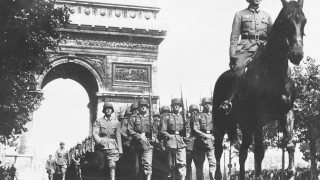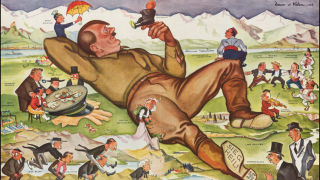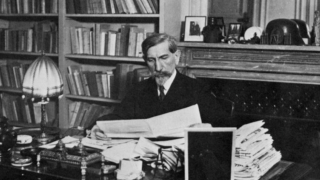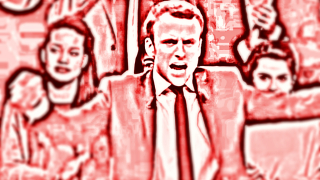Alain de Benoist: Macron is an algorithm
What lessons can you draw from the first round of the presidential election? What differentiates it from all those that preceded it?
Alain de Benoist: The capital fact of this election, the one that confers a veritable historic character to it, it's not the Macron phenomenon nor the presence of Marine Le Pen in the second round. It's the total rout of the two former major parties of government, the PS [Translator's note: Parti socialiste] and Les Républicains. I even predicted it last February, at a moment where no one seemed to notice it: for the first time since the head of state was elected through universal suffrage, neither of the two parties that have alternately governed France for nearly half a century will be present in the second round.
In the past, these two parties together have never represented less than 45% of the vote (57% in 2007, 55.8% in 2012). Today, they hardly represent a quarter together (Fillon 19%, Hamon 6%), less than Sarkozy in 2007 or Hollande in 2012. Both find themselves in a state of ruin and on the verge of implosion. Their decomposition marks the end of the 5th Republic as we've known it. They are the big losers of the election.
However, this unprecedented thunder-strike shouldn't surprise us, as it perfectly conforms to the populist scheme. In all the countries where populism is scoring points, the parties representing the old ruling class suffer the most. We saw that in Greece, in Spain, in Austria, and elsewhere. Now, it's France's hour. And it's doubtlessly only the start, because we will now doubtlessly be headed towards a period of instability, institutional crisis, and great confusion.
Is it the end of the traditional right-left system that we've known for decades?
Alain de Benoist: The old parties of government were also those who carried the traditional right-left divide. The cursor then moved on the horizontal plane, which has wearied the voters who increasingly no longer see what distinguishes the right from the left. Macron and Marine Le Pen both ride the wave of this discouragement regarding the “System.” Here I repeat what I've already written many times: the old horizontal axis corresponding to the right-left divide has henceforth been replaced with a vertical axis opposing those on top to those on the bottom. The people against the elites, the folks against the powerful.
Of course we can try to preserve the left-right pairing at any cost, but we must note that the popular classes are increasingly right-wing, while the bourgeoisie is increasingly left-wing, which already constitutes a revolution.
The results also seem to confirm the split between the metropoles and “peripheral France,” but also between the France that has less immigrants, which votes for Macron, and that which has more, which votes for Le Pen. What do you think?
Alain de Benoist: I actually think that the Macron-Le Pen divide covers to a very large extent the opposition between “peripheral France,” the France of the humiliated, left out, popular classes, who rightly believe themselves to be victims of an exclusion both political, social, and cultural, and the France of the urbanized metropoles where the superior ranks and bobos live, the property-owning classes and the integrated intellectual bourgeoisie, who profit from globalization and always aspire for more “openess.” On one side, the France that earns a good living, on the other that which suffers and worries.
But this spatial opposition, particularly well explored by Christophe Guilluy, also has (especially) the sense of a class opposition. On this subject I share the opinion, not only of Guilluy, but also of Mathieu Slama, according to which “the class struggle politically reappears to favor a duel in the second round that opposes the liberal Emmanuel Macron to the souverainiste Marine Le Pen.”
“Behind this class struggle,” Slama adds, “a clash of two worldviews hides: the liberal and universalist vision, which believes in neither the state nor the nation, and the vision we call today populist or souverainiste, which wants to restore the state, borders, and the meaning of community in the face of the ravages of globalization.”
The symmetric error of the classic right and left has always been to believe that politics could extract itself from the issues of class – the right by its allergy to socialism and Marxism, the left because it believes that the working class has disappeared and because it is no longer interested in the people.
What does Macron represent?
Alain de Benoist: Morphopsychology already tells us that Emmanuel Macron is a temperamental, manipulable little thing and incapable of decision. We'll say he's an algorithm, a synthetic image, a millionaire from the telecommunication industry, a flute player programmed to lead by the tip of the nose those who do not see further than the end of their nose. He's the candidate of the Caste, the candidate of the dominant and the powerful. He's a libertarian-liberal who conceives France as a “start up” and dreams of the abolition of borders and limits, histories and lineages. He's the man of globalization, the man of migratory flows, the man of universal labor instability. The leader of the “progressives” by contrast with those who no longer believe in progress because they noted that it no longer improves their lives, but on the contrary darkens their daily routines.
In the past, the business milieus supported the candidate who they considered most likely to defend their interests (Alain Juppé at the start of the campaign). This time, they judged that it was simpler to present one of themselves. Aude Lancelin isn't wrong, in this regard, to speak of the “CAC 40 putsch” [Translator's note: Cotation Assistée en Continu 40, a major French stock market index.]
The failure of Jean-Luc Mélenchon?
Alain de Benoist: A quite relative failure! Orator without equal, truly occupying the role of tribune, Jean-Luc Mélenchon is the one, in form and substance, who had the best electoral campaign. In the space of a few weeks, he rose higher in the polls than any other candidate, crushing the Smurf of the PS in passing, practically reaching Fillon's level and doubling his score in relation to 2012.
Still more important, this presidential election gave him the possibility of embodying a left-wing populism which, before him, only existed as a rough outline. You may have noticed that he began his rise in the polls starting from the moment where he no longer spoke of the “left” in his speeches, but only of the “people.” It's a revelatory detail. Add to that, unlike Hamon or Duflot, he had the courage to not call to vote in favor of Macron. Personally, I regret very much that he isn't in the second round.
Does Marine Le Pen still have a chance to win? What should the principal axes of her campaign be? Where to find her reservoir of votes?
Alain de Benoist: Her chances in the second round are very weak a priori, since all the polls are giving her a beating. Her principal competitors have called to vote for Emmanuel Macron, starting with François Fillon (who doesn't lack spite), but it remains to be known if their orders will be followed. Vote transfers are never automatic. Besides the abstentionists, Marine Le Pen can hope to garner at least a third of Fillon's votes, more than half of Dupont-Aignan's votes, even 10 or 15% of Mélenchon's votes, but I doubt that will permit her to claim victory. The score of the second round should be 60/40, or 55/45 in the best case.
That said, with 21.4% of the votes (against 17.9% in 2012), Marine Le Pen seriously scores points, not only because she reached the second round, but also because she gathered nearly eight million votes (double of her father in 2002), against only six million in the last regional elections. The most important thing is that she surpassed the PS and Les Républicains, which positions the FN as the principal opposition force against the future “progressive” coalition of Macron.
Nevertheless we'll say that her campaign was very uneven. Not enough lyricism, not enough emotion: she knows how to draw applause, but she doesn't know how to thrill. In her campaign clip, the people were also absent.
Her only chance of winning is to make the majority of French people understand that the second round will not be a vote for or against the Front National, but a referendum for or against globalization. Firstly she must also be able to convince the left-wing voters that it would be senseless for them to cast their ballot for the man of social breakdown and the El Khomri law, the dictatorship of stockholders and the omnipotence of financial markets, for the spokesman of Capital for whom politics is only an instrument put into the service of private interests.
Are you surprised by the weak mobilization in the streets against Marine Le Pen, unlike what we saw in 2002?
Alain de Benoist: I'm not surprised at all. The 2002 election has no relation to the one we just experienced. Only dinosaurs and “antifa” don't understand that the times have changed.
A final remark?
Alain de Benoist: If a screenwriter had written the story of this electoral campaign such as it has actually unfolded in advance, no director would have deemed his scenario credible. Indeed it has foiled all the predictions. François Hollande dreamed for years of running for a second mandate, but he finally had to renounce it. He was usually considered as a skilled maneuver, but he lost control of his own party. The right considered this election to be “un-losable,” and yet it lost. The primaries were supposed to reinforce the power of the parties and designate those best positioned to win the election(Sarkozy or Juppé on the right, Valls or Montebourg on the left), it definitely weakened them and only selected “outsiders” who did not shine.
As to the Macron phenomenon, no one imagined it possible a year ago. Which shows that in politics, nothing is played in advance. History is always open.
Translated by Eugene Monsalvat













